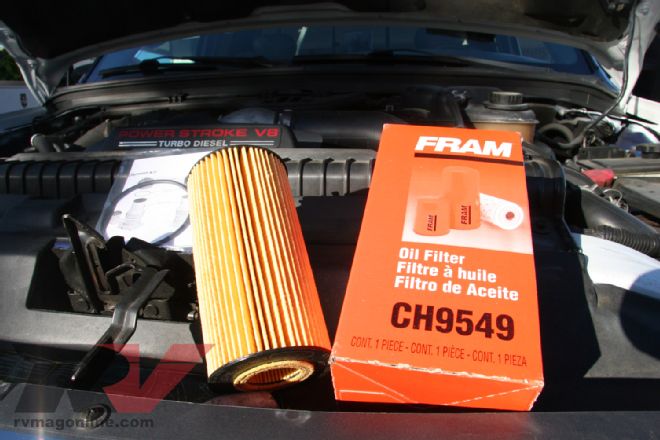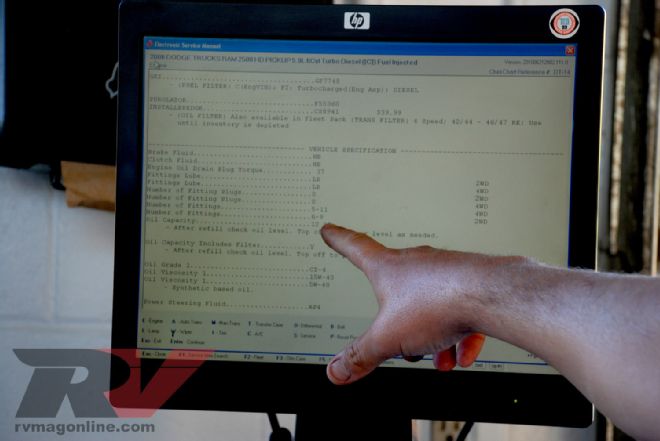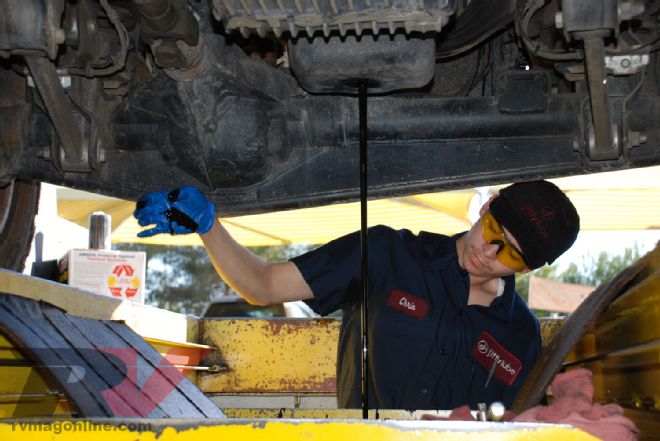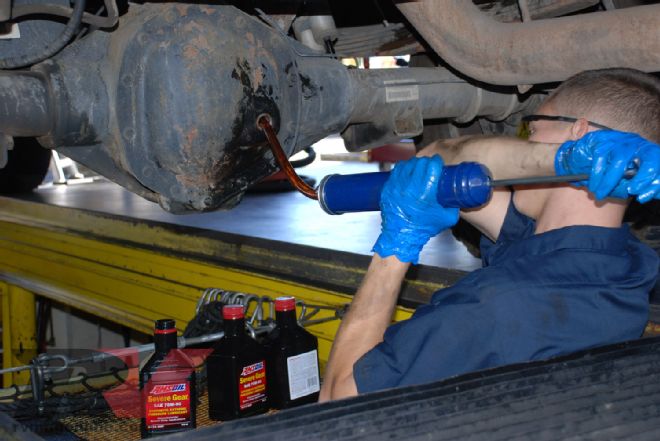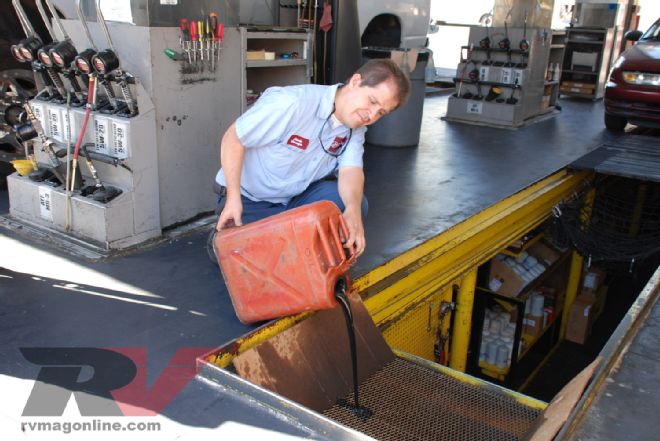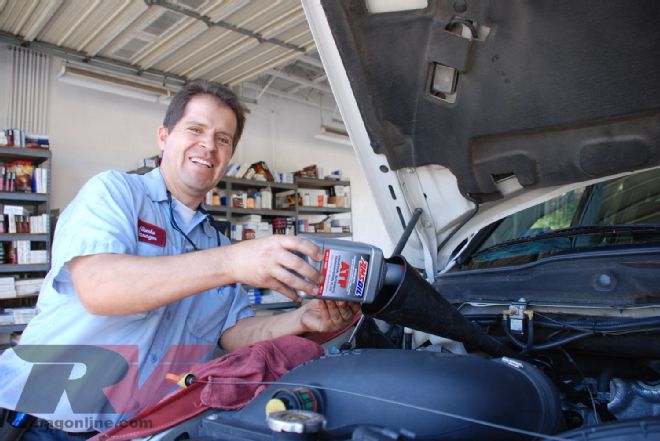We think most people consider themselves very capable of changing their own oil. After all, there's really nothing to it, all you need are common hand tools and a few hours of time. However, if you are doing it just to save a few bucks, then you could be for a real shocker. As we discovered, the money saved by the DIY'er is often miniscule, and there's also the hassle of hazardous fluid disposal if you live any distance from a certified disposal station.

| Alberto Arguello of Jiffy Lube at one of locations that accepts customer requests for special oil or fluids not regularly stocked.
Our research, based on interviews and on-site observations, tells us that the answer as to "why people change their own oil" is not that simple though. Consumers change their own fluids for a number of other reasons besides money, including having the option to use a particular brand of oil or fluid, or because somehow they feel that lube shops are prone to mistakes that wouldn't happen if the consumer did the work at home. There's also the idea that lube shops "up sell" items that aren't needed, which we couldn't confirm or deny, but suspect that there's always a few bad apples in the bunch.
Top 5 reasons why some consumers change their own oil:
1. Familiar with the brand and viscosity oil gets used.
2. Ensures the old oil gets completely drained from the engine and pan.
3. Knows the oil drain pan bolts get torqued down properly on reinstall and a new gasket if applicable.
4. Always buys specific types of oil filter and is careful not to over-tighten it.
5. Can test for leaks.
While all of these reasons are legit, there's one thing for certain, you aren't going to save much money at home, mostly because of the labor and time involved in chasing down the oil and then buying the other products needed to adequately do the job. Moreover, better known lube shops offer workmanship on par with the best home mechanics.
Top 5 reasons why consumers take their vehicles to lube shops:
1. No reason to buy equipment or tools.
2. The work is often guaranteed (check with shop for details).
3. The work can be done in less than an hour.
4. Certain shops offer coupons as discounts (check with shop for details).
5. Shops have tools and expertise to check for other problems, and can change all the fluids, not just oil.
Many consumers aren't aware that some Jiffy Lube outlets, a national chain of lubrication businesses, allow their customers to bring in any brand of oil or fluid (transmission, etc.) they deem necessary, and charge only a small service fee to complete the job. If you really like Amsoil, Mobil or Shell performance oil or fluid, and just can't live without it, some lube shops will pour it for you if you bring in the product. That's a plus for performance enthusiasts that don't necessarily like a facility's brand of oil. And, some of the better-known shops can also analyze check engine light and resolve mechanical problems.
We spent time behind the scenes at a Jiffy Lube in Southern California, managed by Alberto Arguello, to watch, learn and listen as his technicians performed typical fluid changes on a series of vehicles, including several one-ton work trucks. We brought Alberto our own complete line of Amsoil products for engine and transmission. What we discovered is that there's a lot of redundancy in their work, and that every nut and bolt was checked and rechecked. This statement might be true with the other national chains as well. We saw how the Jiffy Lube crew did a complete check of the tire psi, washer fluid level, interior air filter, and battery. As for "up sell" notion, well we didn't experience it, although they did suggest that we change our dirty engine air filter, which we did.
On the other part of town, a local electrical contractor changed his own oil and fluids at home. Our impromptu test was created to see who came out on top financially and otherwise. The contractor was adamant about using Shell's new Rotella Triple T synthetic oil, which wasn't available at his local quick-lube shop. The entire job took him about 4 hours, including the disposal of the waste. If we factor in minimum wage for the labor that work would have cost him $32 ($8 per hour). He also needed an oil pan ($3), a wrench for drain plug($3), a filter wrench ($3), a funnel ($2) and jacks or ramps ($40). So without factoring in the oil or filter, our contractor spent $83 and half a day of his time. Sure, he'll never have to buy the equipment again, and he got the Shell oil he wanted, but he's going to be out the labor charge on every oil change. And that's just the basics. If he goes for a complete fluid change on some vehicles it would involve more tools, and more labor time.
The average price of a quick-lube station is $30 for a complete oil and filter change. The price increases for special requests or additional work, but on average you can be in and out fairly cheaply.

| Besides spending a day with Jiffy Lube, we also followed along as a contractor changed his own oil at home using Shell's Rotella Triple T to determine which method of maintenance was the cheapest, and easiest.
In a nutshell, we concluded that companies like Jiffy Lube definitely help prevent future mechanical issues by testing the vehicles onsite, something that most of us can't or won't do at home. Our contractor across town meanwhile, didn't have the necessary equipment to handle the transmission, gear axle and rear end fluid change on his Ford F250 diesel and had to take it to another shop for that kind of service.
The contractor said he was happy to change his own oil and did so because he was confident that the work was being done correctly. That seemed to be the biggest concern with the consumers we spoke with about the story. We heard several stories where quick-lube shops inadvertently made a mistake, which ended up costing the consumer more time and trouble getting the problem resolved. That lack of consumer trust seemed to the detriment of lube shops, although we experienced nothing but professionalism during our visit with Jiffy Lube. So the contractor's concern about workmanship was probably more of a generalization than actual fact when you consider how many different shops there are in the country.
But for peace of mind, we think you should get to know your local quick lube shop and find out the kind of services or special offers they have before they do the work. If they seem like good guys and respect your concerns, then you've off to a good start. The other advantage to quick-lube shops is that many of them can handle full size trucks and even larger RVs. And you'll never have to worry about hazardous fluids being stored in your garage ever again.
We understand that saving money is a concern in these economic times, and so for us, it makes sense to go to a quick-lube shop. But if you like doing the work yourself, then by all means have at it, and know that there's always an alternative if you find yourself in a squeeze for time.
No matter what way you go, it always pays to service your vehicle regularly.
Source
Jiffy Lube Service Center #1411
(661) 222_9367
www.jiffylube.com
